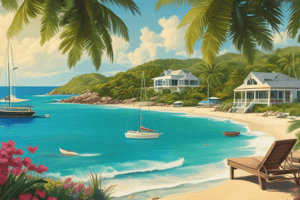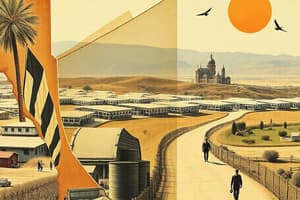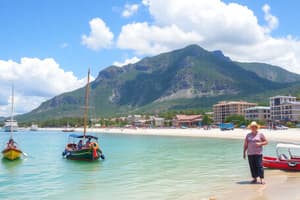Podcast
Questions and Answers
What is the definition of tourism?
What is the definition of tourism?
- A collection of leisure activities conducted in familiar surroundings.
- Activities involving travel within one's own country for leisure.
- Travel and stay in places outside one's usual environment for not more than one consecutive year. (correct)
- Engaging in international travel exclusively for work purposes.
Which of the following defines a key characteristic of the tourism industry?
Which of the following defines a key characteristic of the tourism industry?
- Customer satisfaction, safety, and enjoyment are not significant focuses.
- It has a fixed set of services that do not change over time.
- It primarily targets only luxury travelers.
- It requires constant adaptation to customers' changing needs and desires. (correct)
What distinguishes a tourist from a traveler?
What distinguishes a tourist from a traveler?
- Tourists engage only in sightseeing while travelers blend in with locals. (correct)
- Tourists primarily try local cuisines, whereas travelers stick with comfort food.
- Tourists negotiate for deals while travelers are willing to pay more.
- Tourists dress for style while travelers prioritize comfort.
How does tourism impact the economy?
How does tourism impact the economy?
When did tourism in the Philippines begin to take shape?
When did tourism in the Philippines begin to take shape?
Which of the following statements about the Philippines is NOT true?
Which of the following statements about the Philippines is NOT true?
What does the term 'global phenomenon' imply in the context of tourism?
What does the term 'global phenomenon' imply in the context of tourism?
Which factor is essential for the success of the tourism industry?
Which factor is essential for the success of the tourism industry?
What nickname is given to the Philippines in the context of tourism?
What nickname is given to the Philippines in the context of tourism?
During which major historical event did Philippine tourism decline significantly?
During which major historical event did Philippine tourism decline significantly?
How many foreign tourists were recorded in the Philippines in 2015 at its peak?
How many foreign tourists were recorded in the Philippines in 2015 at its peak?
What does the term 'outbound tourist' refer to?
What does the term 'outbound tourist' refer to?
Which type of tourist is characterized as self-inhibiting and prefers familiar destinations?
Which type of tourist is characterized as self-inhibiting and prefers familiar destinations?
What characterizes an allocentric tourist according to Plog's theory?
What characterizes an allocentric tourist according to Plog's theory?
What is the primary motivation of a mid-centric tourist?
What is the primary motivation of a mid-centric tourist?
What is a characteristic behavior of a psychocentric tourist regarding travel methods?
What is a characteristic behavior of a psychocentric tourist regarding travel methods?
What is one classification of tourists based on the purpose of their travel?
What is one classification of tourists based on the purpose of their travel?
Which type of transportation falls under the category of 'water' for tourists?
Which type of transportation falls under the category of 'water' for tourists?
What is a characteristic of 'back-packers' as a tourist group?
What is a characteristic of 'back-packers' as a tourist group?
How are tourists classified by duration of their trip?
How are tourists classified by duration of their trip?
Which category of tourism specifically highlights historical and cultural aspects?
Which category of tourism specifically highlights historical and cultural aspects?
What does the 'Access' in the Five A's of Tourism refer to?
What does the 'Access' in the Five A's of Tourism refer to?
Which group is described as having high disposable income and being well-educated?
Which group is described as having high disposable income and being well-educated?
What defines 'alternative tourism' as a type of travel?
What defines 'alternative tourism' as a type of travel?
Flashcards are hidden until you start studying
Study Notes
Learning Objectives
- Understand the concept and significance of tourism.
- Explore the origins and evolution of tourism and hospitality.
- Assess tourism's economic contributions.
- Identify the various components of tourism.
- Differentiate between types of tourism.
Definition and Nature of Tourism
- Involves activities of individuals traveling outside their usual environment for leisure, business, or other purposes, for less than one consecutive year.
- Characterized as a dynamic and competitive industry that adapts to changing customer needs focused on satisfaction, safety, and enjoyment.
- Distinction between tourists and travelers: tourists stand out, while travelers blend in; tourists seek comfort food and well-known sights, while travelers seek local experiences and cuisines.
Global Perspective on Tourism
- Recognized as a global system with extensive infrastructure impacting society, politics, culture, and the economy.
History of Philippine Tourism
- Originates from ancient migrations through land bridges to the Philippines from regions such as Taiwan and the Malayan archipelago.
- The Philippines is the third-largest English-speaking country and has a diverse cultural history influenced by Asian, European, and American elements.
- Recognized as one of Asia's best travel destinations, known as the "Pearl of the Orient Seas."
- Post World War II tourism decline due to economic devastation and loss of heritage sites; continued declines resulted from political instability.
- A peak of 5,360,682 foreign tourists recorded in 2015.
Types of Tourists
- International Tourist: Foreign nationals visiting a country.
- Domestic Tourist: Individuals traveling within their own country for tourism.
- Outbound Tourist: Travelers going from their home country to another.
Plog's Theory of Tourist Motivation
- Allocentric Tourists: Seek new experiences; adventurous and outgoing; prefer exploration of unique destinations.
- Psychocentric Tourists: Cautious, prefer familiar destinations; less adventurous; avoid air travel for psychological reasons.
- Mid-Centric Tourists: Balance between allocentric and psychocentric; open to new experiences with preferences for cultural and ecological tourism.
Aspects that Describe a Tourist
- Reason for traveling, length of stay, and place of origin.
Transportation Methods
- Include road (cars, buses), railway (regular and irregular), air (various connections), and water (river and sea).
Classifying Tourists
- By Product: Mass tourism vs. alternative tourism; package tours vs. ecotourism.
- By Nature of Activity: Active vs. passive; adventure tourism vs. sightseeing vs. beach holidays vs. cruises.
- By Duration and Distance: Day trips, weekend breaks, annual holidays; local, national, and international travel.
- By Purpose: Cultural, historical, nature-based, rural tourism, personal development, social status, and recreation.
- By Age/Socio-Economic Group: Various groups including backpackers, DINKs (Double Income No Kids), SINKs (Single Income No Kids), empty nesters, and baby boomers.
Destination Assessment: Five A's of Tourism
- Attractions: Sites of cultural, historical, or natural significance attracting tourists.
- Access: Importance of transportation means such as airlines, bus services, rail lines, or ports for effective destination functioning.
Studying That Suits You
Use AI to generate personalized quizzes and flashcards to suit your learning preferences.





